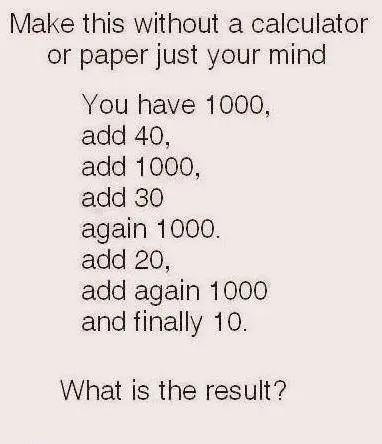Have you ever stopped to think about the true potential of your mind? The human brain is an amazing tool, capable of handling complex calculations and tasks. Despite its capabilities, many of us often rely on calculators or other devices for even the simplest math problems. This article introduces a fascinating puzzle that challenges you to rely entirely on your own mental abilities—no calculator allowed. Are you ready to put your brain to the test?

The Puzzle
The challenge itself is quite simple, but even the most seasoned problem-solvers often get tripped up by it. Here it is:
Start with 1000.
Add 40.
Add 1000.
Add 30.
Add another 1000.
Add 20.
Add a final 1000.
Add 10.
If you rushed through it, you probably came up with 5000 as the answer. But the real answer is actually 4100. This mistake is very common, and it’s due to the way our brains quickly process information, sometimes skipping over the smaller details. Let’s break down the calculation step by step to see how to avoid this common error.
Breaking Down the Calculation
To understand it clearly, let’s break it down slowly:
- Starting point: 1000
- Add 40: 1000 + 40 = 1040
- Add 1000: 1040 + 1000 = 2040
- Add 30: 2040 + 30 = 2070
- Add another 1000: 2070 + 1000 = 3070
- Add 20: 3070 + 20 = 3090
- Add a final 1000: 3090 + 1000 = 4090
- Finally, add 10: 4090 + 10 = 4100
The correct answer is 4100. It seems simple now, right? But why do so many people think the answer is 5000?
Why Our Brain Gets Tricked
This puzzle is a perfect demonstration of how our brains sometimes use cognitive shortcuts that can lead us astray. When performing calculations quickly, our brains tend to group the larger numbers first—adding all the 1000s to get 4000—and then add the smaller numbers (40, 30, 20, 10). Because this is done quickly, our brains often end up overshooting and arrive at 5000 instead of 4100.
This kind of mistake is caused by something called cognitive overload. When we try to mentally juggle too much information at once, we often resort to shortcuts and assumptions instead of taking the time for precise calculations. The more numbers we need to add, the more our brains try to simplify the process, and that’s where mistakes happen.
Strengthening Your Mental Math
Now that you understand why this mistake happens, it’s time to focus on improving your mental math skills to avoid falling into these traps in the future. Breaking calculations down into smaller steps and double-checking your work is key. Here are a few effective tips to help you sharpen your mental math skills:
1. Visualize the Numbers
Instead of allowing your brain to rush through the sequence, try to visualize each step as if you’re writing it down on paper. This helps you keep track of the running total and minimizes the risk of miscalculations.
2. Practice with Smaller Numbers
Start with smaller numbers before moving on to larger sums. This helps train your brain to handle bigger calculations accurately and build confidence in your mental math abilities.
3. Stay Calm and Slow Down
Cognitive overload often occurs when we try to solve problems too quickly. Take a deep breath, slow down, and approach each step with patience. A calm approach will help you focus better and avoid mistakes.
4. Use Estimation as a Tool
If precision isn’t essential, estimation can be very useful. But for exercises like this puzzle, precision is key, so break down the calculations methodically instead of estimating.
5. Practice Regularly
Mental math, just like any other skill, improves with consistent practice. Dedicate some time each day to solving puzzles or problems similar to this one, and you’ll soon notice an improvement in your mental sharpness and accuracy.
The Importance of Keeping Your Brain Sharp
Just as physical exercise is essential for keeping our bodies fit, mental challenges are crucial for maintaining a sharp mind. Engaging in puzzles like this strengthens cognitive function, improves concentration, and enhances problem-solving skills. Regular mental exercises can also help prevent cognitive decline as you age.
In a world where we often rely on technology to do our thinking for us, taking the time to solve problems mentally is a great way to reconnect with your own brainpower. The next time you feel tempted to reach for your phone’s calculator, consider giving your mind a chance to figure it out instead. You might be surprised by what you can do.
Conclusion
The mental math challenge presented here is more than just a simple exercise—it’s a reminder of the incredible capabilities our brains possess. Sure, it’s convenient to grab a calculator, but working through these kinds of problems mentally helps keep your brain active and engaged. If you found yourself tricked by the 5000-answer mistake, don’t worry—you’re not alone. The key is to slow down, visualize each step, and take it one calculation at a time. Not only will you get the correct answer, but you’ll also give your brain the healthy workout it needs. So the next time you come across a simple math problem, challenge yourself to solve it without any help—you’ll be giving your mind the exercise it deserves.





